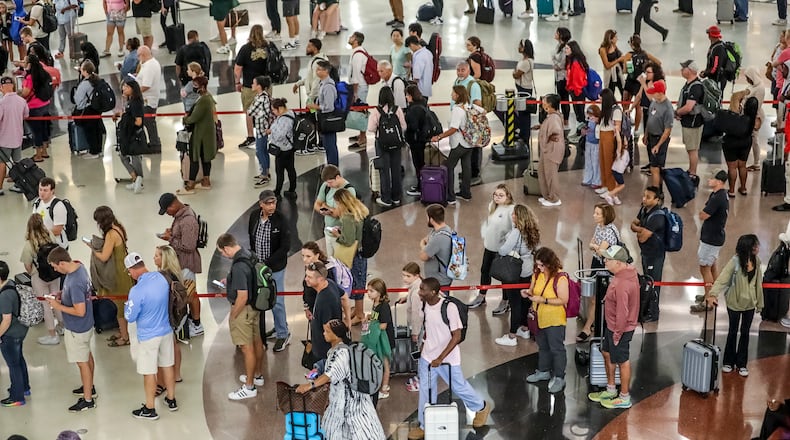If history is a guide, a federal government shutdown is likely to mean already frustrating wait times and delays at Hartsfield-Jackson International, the world’s busiest airport, will only get worse.
During the last federal shutdown that started in late December 2018 and continued into January 2019, many travelers ended up waiting in security lines as long as an hour and a half at Hartsfield-Jackson, causing some to miss their flights. Air traffic controllers and Transportation Security Administration officers would be deemed essential and would have to work without pay if lawmakers can’t work out a deal to keep government funded.
In fact, gridlock at the nation’s airports proved to be one of the reasons the last shutdown ended after 34 grueling days.
In January 2019, some federal workers started calling out from the job or quitting after they missed their first paycheck. TSA said its unscheduled absence rate was 7.6% on the Monday after workers missed their first paycheck, more than twice the typical rate.
As a result, during that January 2019 shutdown period, Delta Air Lines advised getting to the Atlanta airport three hours early. Air traffic controllers stood outside the terminal holding up signs and handing out leaflets calling for an end to the federal shutdown.
Credit: Miguel Martinez
Credit: Miguel Martinez
In need of money to pay rent and bills, the last shutdown caused hardship for federal workers who weren’t being paid. They waited in cars lined up through a parking lot near a TSA office and down the block for free food from the Atlanta Community Food Bank, including vegetables and frozen chicken. Some were in their uniforms as they waited in their cars for the food. Others had children or family members with them.
TSA at the time flew in some officers — who were also not being paid — to help handle long lines at the Atlanta airport.
If new funding isn’t approved before the government reaches the end of its fiscal year — this Saturday — a shutdown would hit as the Atlanta airport struggles with already-long security waits and numerous construction projects that have frustrated travelers.
This month, heavy travel volume is causing checkpoint wait times have already reached more than half an hour even during non-peak times, and even longer during busier periods, with lines stretching through the terminal and winding through baggage claim.
TSA staffing was affected by a decision to put some officers in training this month. Traffic typically eases in the fall from summer highs, but there has been a record number of passengers passing through checkpoints this year, with continued heavy traffic in September. Vacationers headed out on trips with schools out on fall break and a recovery of business travel are bringing more travelers to the Atlanta airport daily.
At the same time, a months-long construction project at the Atlanta airport’s main security checkpoint has several lanes closed, reducing capacity until the project is completed next year.
“We’re monitoring the situation and are prepared to address any operational challenges caused by the shutdown,” Hartsfield-Jackson spokesman Andrew Gobeil said in a statement.
“During similar events in the past, we collaborated with our partners to ensure federal employees who are required to work with deferred pay are provided the resources necessary to maintain their well-being,” he said. “We expect to do the same if needed this year.”
Delta CEO Ed Bastian said during the January 2019 shutdown that it cost the company $25 million in revenue that month due to a decline in travel by government contractors and employees.
The U.S. Travel Association said last week that a survey it commissioned found that 60% of Americans said they would cancel or avoid trips by air in the event of a shutdown. All told, it would cost the travel economy $140 million per day, according to the group.
Long waits for passports, visas and Global Entry applications would further constrain travel, according to the U.S. Travel Association.
Efforts to resolve chronic staffing shortages at some of the busiest air traffic control facilities could be stymied if a shutdown is prolonged. Acting FAA Administrator Polly Trottenberg said earlier this month that if there is a government shutdown, it would disrupt the process of hiring, training and certifying 1,800 air traffic controllers.
The Air Line Pilots Association union, which represents pilots at Delta and other major airlines, said pilots depend on the FAA including its air traffic controllers “to help safely shepherd us through the skies.”
“The slowdowns and loss of safety personnel that we experienced during previous shutdowns were unacceptable,” said ALPA President Jason Ambrosi, who is also a Delta pilot, in a written statement. He added that “it is essential that hiring, training, and pay for these vital air safety professionals are not interrupted by any lapse in funding.”
About the Author
The Latest
Featured



